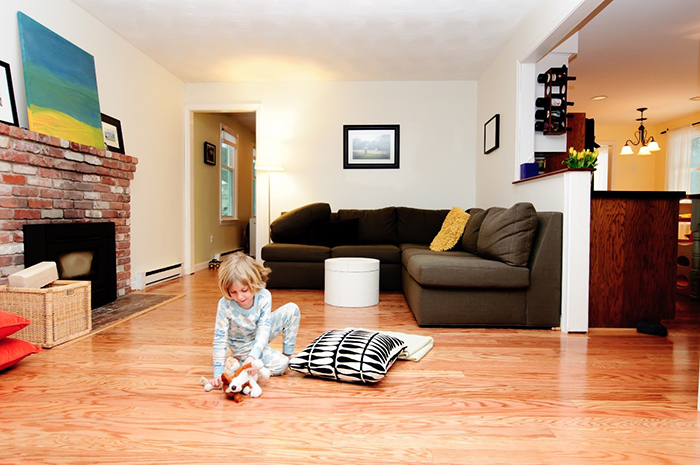
While there may be no such thing as a “perfect” home, that doesn’t mean you can’t find a home that’s perfect for your family’s needs. Whether you’re searching for a place to rent or buy, the following tips will help lead you there.
1. Location, Location, Location
Yes, it’s become a cliché, but for most of us location is going to trump other considerations in the search for a new home. Unlike paint color or lawn decorations, you can’t change the safety of the neighborhood or the quality of the local schools your children will attend.
You can, however, do some homework to check both of those things. CrimeReports.com shows what criminal activity has been reported in your area and where registered sex offenders live. To learn more about the local school system visit GreatSchools.org, which offers public and private school reviews. The school district’s website should also offer additional insight into school performance.
There’s more to consider than safe streets and good schools, though. Do you envision your kids playing in a yard, or family walks around the block? If so, a home on a busy road may not suit you. How far are you willing to drive for your commute? Although a one-hour commute may seem like a fair trade-off for a home that’s ideal in every other way, how are you going to feel about that drive in six months or a year?
2. Identify Non-Negotiable Amenities
A wish list of features for your future home can quickly spiral out of control, especially since every family member will weigh in with their opinions. Still, you can prioritize the amenities and features that are most crucial. Space will probably be at the top of the list – bedrooms and bathrooms especially. Your family may also need more than one bathroom if you all head out the door at the same time every morning. And if you work from home, you might need space for an office.
While you need to be flexible, don’t try to convince yourself that you can learn to live without a feature that’s important to you. If hosting large family dinners is a part of your weekly routine, will you be happy if your home only has a small eat-in kitchen? Think about the features that matter most and hone in on those in your search. Anything extra is gravy.
3. It’s All About the Money
Talking about budgets can be a bucket of cold water on a happy home search. Imagining furniture placement, landscaping plans and a new neighborhood? Fun. Talking about what you can actually afford? Not so much fun.
Personal finance experts usually urge us to draw a hard limit of 30 percent of our income on housing (less, ideally). Zillow has a rent affordability calculator as well as a mortgage calculator so you can get a snapshot of what you can afford to spend. People break this rule all the time but they do so at their peril, with insufficient savings and investments (ever hear the term “house poor”?).
Also keep in mind that there are costs beyond the mortgage or rent. You’ll want to know average utility costs and costs to maintain and improve the property if you’re buying. If an agent is helping you find a rental, you may have to pay a fee there too. Your new home may bring about new expenses, such as more money for utilities, or gas and car maintenance if you face a long commute, so be sure to factor in all foreseeable costs. Only then can you accurately determine whether your preferred neighborhood or the features you desire are within budget. Be prepared to make some compromises if you find they’re not.
4. Use the Right Tools to Help You Search
You’ve probably know that you don’t need to scour newspaper ads or real estate circulars in the 21st Century – but before you dive in and start scouring home listings online, spend some time physically walking around the neighborhoods you’re considering to get a gut-level feel for the area and whether it’s somewhere you actually want to live. Talk to the natives, stop by local businesses and sit on benches in the neighborhood park. Learn where the best streets in the neighborhood are, and the worst.
The average home search takes 10 weeks, so once you’ve found a couple neighborhoods you love, hit the virtual pavement and start browsing listings; Realtor.com, Zillow and Trulia are great places to start. If you’re looking to rent, check out Craigslist, HotPads, Rent.com and Apartments.com. All of these sites have apps so you can get the info on the go.
Use these online resources as a starting point. Once you’ve found some promising properties, enlist the services of a real estate agent if you’re buying. Real estate agents are not created equal though, so following some tips for picking your agent is crucial. Finding someone who will help you with a rental is a bit trickier, although there are agents who specialize in rental properties. You might have to pay his or her commission, but sometimes the landlord will. Be sure to ask before you commit.
5. A Place for Everyone
So you think (fingers crossed!) you’ve found a place that might just be perfect for your family. Neighborhood? Check. Affordability? Check. Features? Double-check – meaning check twice to see if the home really does meet everybody’s needs, especially if a family member has special needs. If you have pets, make sure animals are allowed and that there will be enough room.
 Does your new home also have enough room for your children to play or pets to roam? Image by mamaloco
Does your new home also have enough room for your children to play or pets to roam? Image by mamalocoAfter walking through the home, you’ll have a better sense of how the space will work for you. Don’t be afraid to go with your gut. If you can picture your furniture in the space, if you can imagine your children playing, if you see yourself living there, then it’s a good bet you’ve found a winner. If, on the other hand, something just doesn’t feel right despite how great the home looks, then it may be time to walk away.
6. Reaching the Dotted Line
Once you’ve found a place, you’ll need to complete some paperwork and get the landlord’s approval. Before you sign a lease agreement, make sure you’ve inspected the property. Any damage you find should be documented so that you’re not held responsible down the road. Serious problems should be repaired by the landlord before you move in. If he or she is unwilling to do so, that’s a red flag. You may decide you can live with minor flaws, but you should still make sure they’re noted in the lease so you don’t have to pay to fix them when you move out.
You’ve heard this before but we’ll say it again: don’t sign anything before you read it. Lease agreements can be complicated documents but every word must be read. If the lease says utilities are included, ask which ones. If there’s a pet charge, make sure you know how much it is and whether it’s a fee (non-refundable) or a deposit (refundable). If you’ll be responsible for maintenance, find out what duties you’re expected to fulfill. Leases aren’t one-size-fits-all documents, and it’s likely the landlord has included some terms unique to that property. Know what those terms are before you sign.
7. Have a Backup Plan
If you think a home is ideal, chances are someone else does too. In many areas it’s tougher to rent than to buy, so you may face a lot of competition when it comes to nabbing a desirable place. Having other options is important in case your first choice falls through.
While you’re waiting for the landlord or seller to accept your offer, continue to look at other places. New properties become available all the time, so something new may have popped up. However, don’t get caught up in a game of thinking something better might come along. If you’ve done your research and decided on a property that meets the needs of everyone in your family, then you can confidently end your search, take the keys and open the door to your new home sweet home.
This entry was originally published on November 5th, 2015.
Credit: Featured image by njhomepictures



